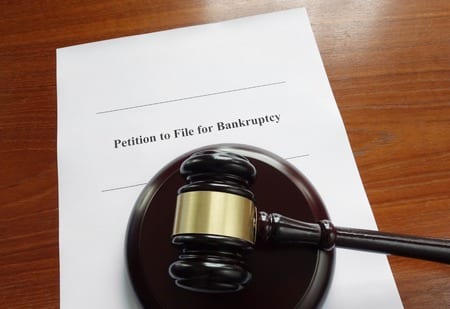 How do I file for bankruptcy is a common search term on Google and other search engines. If one files either a Chapter 7 Bankruptcy or a Chapter 13 Bankruptcy, one may either represent oneself, pro se or enlist the services of a bankruptcy attorney or bankruptcy lawyer.
How do I file for bankruptcy is a common search term on Google and other search engines. If one files either a Chapter 7 Bankruptcy or a Chapter 13 Bankruptcy, one may either represent oneself, pro se or enlist the services of a bankruptcy attorney or bankruptcy lawyer.
Chapter 7 and Chapter 13 bankruptcy are the two most commonly filed forms of bankruptcy. Currently, the filing fee for a Chapter 7 bankruptcy is $335.00 and the filing fee for a Chapter 13 bankruptcy is $310.00. In addition, the debtor must generally obtain a credit counseling certificate before filing either form of bankruptcy. The certificate may be obtained by contacting any of a number of organizations that are authorized to provide such certificate. The fee charged by these organizations currently range from a low price of $14.95 to as much as $100.00. This certificate requirement is one of the manifestations of the 2005 Bankruptcy Act.
After the filing of the bankruptcy, one must generally also obtain what is termed a debtor education certificate. Again, there is a range of prices depending upon what authorized provider you use. If you are required by the 2005 Bankruptcy Act to obtain these certificates, it is important that this requirement is not neglected. A study was conducted finding that more than 99.9% of the debtors in bankruptcy seeking such certificates were able to obtain such certificates. However, if one does not obtain such certificates, if required, either the initial filing of the bankruptcy can be disavowed by the bankruptcy court, or a discharge may be denied.
If a bankruptcy is denied because a debtor has not obtained the debtor education certificate, the debtor is not afforded the benefit of a bankruptcy discharge. The discharge is withheld. In order to obtain the discharge in bankruptcy, the debtor may be required to reopen the bankruptcy, complete the debtor education certificate, and thereafter obtain his or her discharge in bankruptcy. This can be an expensive proposition. The reopening of a bankruptcy may cost as much as a thousand dollars. The fee for a debtor education certificate may be as low as $20, depending upon the fees of the provider.
In addition to the filing fee, the debtor in bankruptcy must submit a bankruptcy petition to the bankruptcy court. The bankruptcy petition in a Chapter 7 bankruptcy or a Chapter 13 bankruptcy contains a list of schedules. For example Schedule A lists any real estate or real property that the debtor may own or have an interest, Schedule B lists personal property that the debtor owns, Schedule C lists exemptions that the debtors are claiming, Schedule D lists secured debts that the debtor has, Schedule E lists priority debts, and Schedule F lists unsecured debts. The schedules continue and terminate at Schedule J, which lists the expenses of the debtor.
The bankruptcy petition filed in Chapter 7 and a Chapter 13 bankruptcy are predominantly similar. However, the Chapter 13 bankruptcy must also contain a Chapter 13 plan wherein the debtor proposes how he or she intends to treat the various creditors contained in his or her bankruptcy. The Chapter 7 bankruptcy must contain a statement of intentions wherein the debtor describes how he or she intends to treat certain of his or her secured debts. A statement of intentions is not necessary for a Chapter 13 bankruptcy because such intentions are described in the Chapter 13 plan.
In addition to the bankruptcy petition, most bankruptcy courts usually require additional documentation such as evidence of income, bank statements, prior tax returns, contracts entered with certain creditors, registrations and titles to certain assets. In the Middle District of Florida, the bankruptcy trustees and the bankruptcy court usually demand copies of the last six months of paycheck stubs or invoices received by the debtor, the last two years of tax returns filed, and copies of the last six months of bank statements. These are the minimum requirements. Sometimes, the bankruptcy trustee may request information or documentation exceeding these minimum requirements.
This article is a description of the basic requirements that need to be fulfilled in order to file a Chapter 7 bankruptcy or a Chapter 13 bankruptcy. In essence, this article is bankruptcy in a nutshell. Bankruptcy law and the practice of bankruptcy law has become incrementally more complex since this writer began practicing in 1993. This article is intended to only present the basic requirements necessary to file a bankruptcy. There are many issues and difficulties that may be present in the filing of a form of bankruptcy. It is best to consult with an experienced, knowledgeable and diligent bankruptcy attorney before undertaking the process of filing a bankruptcy.
Weller Legal Group, PA is a law firm that is primarily dedicated to representing debtors in the filing of bankruptcy. Weller Legal Group, PA is considered by many in the legal community to be the premier, remaining bankruptcy law firm in the Tampa Bay area. With offices in Clearwater, Brandon, Lakeland, and Port Richey, we are conveniently located throughout Tampa Bay and Western Florida in the service of those who need to file bankruptcy.
Copyright : rawpixel

